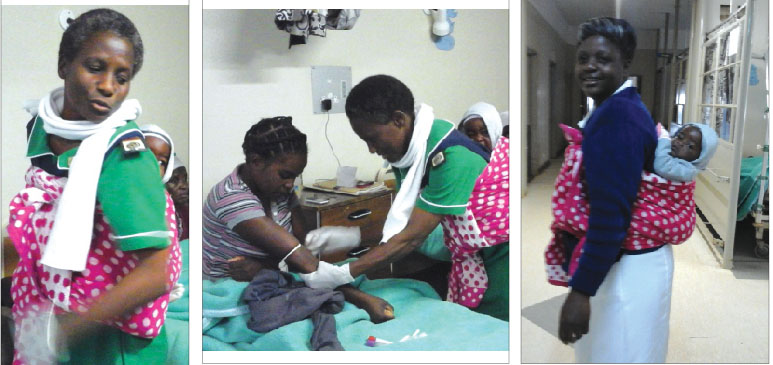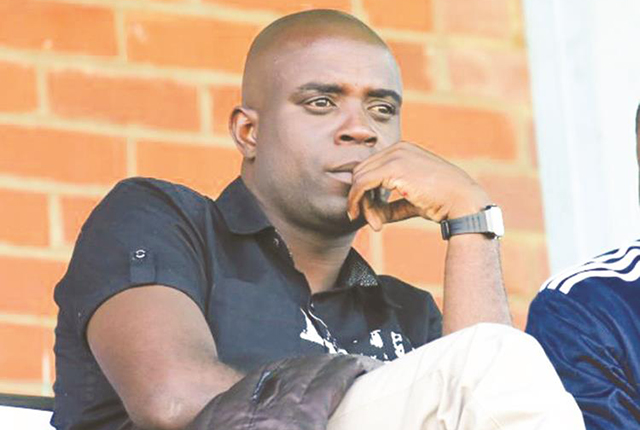Matambo: Nurse with heart of gold


This picture collage shows Sister Charity Matambo (50) of Chinhoyi General Hospital with a patient’s child strapped to her back, Sister Matambo attending to a patient with the baby on her back and a colleague comforting a baby while its mother is undergoing surgery. — (Pictures by Roselyne Sachiti)
Roselyne Sachiti Features Editor
Charity Matambo (50), a sister-in-charge at Chinhoyi General Hospital, Mashonaland West Province, straps seven-month-old Ashel Atipaishe Magombo to her back.
It is Tuesday June 27, 2017 and resplendent in her green uniform, baby on her back, she attends to patients in the hospital’s gynaecology ward.
The ward houses women undergoing obstetric fistula repair surgery.
Fistula is a hole between the birth canal and bladder or rectum caused by prolonged, obstructed labour.
The condition leaves women leaking urine and faeces or both over time, resulting in depression, social isolation and deepening poverty.
First as a nurse, and then working with patients who have fistula, Sister Matambo spends her time ensuring the women who have been shunned by society are well taken care of as they start their journey to recovery.
The time is 9am and Ashel’s mother, Christwish Shupikai Chimhini has gone for the surgery that will change her life for the better.
Aware of his mother’s prolonged and unusual absence, unfamiliar faces and chatting women around him, Ashel registers his displeasure and cries.
Sister Matambo, who is attending to a patient briefly stops, ensures Ashel is comfortable on her back, pats him and goes back to her work.
With the way she comforts the child, it is hard to imagine that it is not hers.
This has become a norm in this ward and testimony of how much dedication she has to her job and patients.
Such acts of kindness make Sister Matambo and her team stand out, like a sore thumb, yet to them it is like any other normal day in the office.
Being a nurse was always her childhood dream.
“I always wanted to be a nurse. I do not know why, but I have this big heart for people. When doing my work, I do it out of my heart. I feel that I have to help people.
“At times it seems as if I do not have a heart when I tell people to stop doing certain things,” she tells The Herald.
In this ward, they always have patients coming with babies during fistula repair camps and she has turned into a part time mother.
When women bring their babies to hospital, Sister Matambo does not grumble.
She ends up playing a nurse, mother, grandmother and “nanny” role.
“I put myself in their shoes and imagine how I would also want nurses to treat me should I find myself admitted in hospital one day.
“At every fistula camp, we have at least two patients with small babies. Depending on the age, some of the babies do not want people they do not know close to them.
Her warmth has made the situation manageable.
“We always try by every means to make them comfortable and even bath them when their mothers are there. This also promotes hygiene and trust,” Sister Matambo adds.
If her experience of working with women and their babies has taught her anything, it is that there is indeed nothing impossible.
“As part of my work, I deal with heartbreaking cases of women who have lost everything, their dignity and husbands included, because of obstetric fistula.
“I always tell them that being at the hospital is a new start to their lives. Each case is different. They each have different types of fistulas and their experiences, fears and hopes are also diverse.”
Despite the situations she has to handle, Sister Matambo still has a heart of gold and takes each day as it comes and when need arises, goes out of her way to make sure the welfare of patients comes first.
“At the hospital, we have nowhere to put the babies whose mothers would have come for the fistula repair camps.
“Family dynamics sometimes do not allow the mothers to leave their children behind. Most women coming here are divorced as a result of their condition.
“Breastfeeding mothers cannot leave the baby at home. I just check whether the baby needs a nappy change, has been fed, strap him or her to my back and continue working,” she says.
Her kindness is proving to be contagious as other nurses in the ward are following suit.
“At every camp, we have two patients with babies they bring to the hospital. You cannot stop working because there is no one to look after the baby.
“When you are at home you carry your baby on your back and do your household chores.
This is what we are simply doing here,” she explains.
When the women come to the fistula camp, bonds and friendships are easily made as they share their experiences.
Seeing the women realise that they are not alone and there is hope is one of the high moments for nursing staff in Sister Matambo’s ward.
At the camps, women waiting for their turn for surgery sing gospel songs and dance. Most of them have lived a life of rejection because of the stench of urine and faeces.
Their experiences have created bonds of friendship where they take time to help each other apply make-up, laugh and talk, even lend each other money just to lessen the burden of living with fistula.
And at times, Sister Matambo and her team join in the singing just to show the women that despite their condition, they still have dignity and are beautiful.
“I sing with the women. We laugh, talk of issues pertaining life and also educate them on the lifestyle at home for the three first months after surgery,” she adds.
Sister Matambo also has a unique bond with patients.
“I usually work 10 hours because I have to wait for the last patient to return from theatre. The patients want me to be on duty always so that they can air their grievances to me,” she adds.
She says the crop of today’s nurses and that of yesteryear are different.
“Some of today’s nurses have a passion for their job, others do not. It depends with individuals,” she adds.
Her first job was at Chinhoyi Hospital where she worked as a nurse for 20 years, three years training and 17 years working.
Sister Matambo is a single mother of one.
She is also a grandmother to her one- and-two-month-old grandchild yet in reality she has also played the role of “grandmother” to many different children at her workplace.
In the ward, other nurses call her Umongameli, loosely translated to our leader, a fitting tribute given the amazing work she does.
In Sister Matambo, Chinhoyi General Hospital has a dedicated employee, who is not seeking glory or praises but a genuine desire to put a smile on her patients` faces.
[email protected] , twitter @RoselyneSachiti









Comments